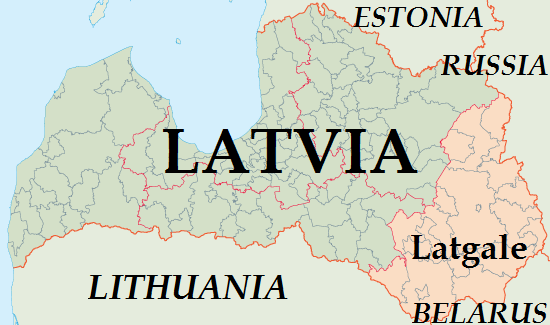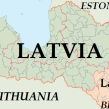
Putin and Latvia’s Latgale: Ethnicity as Explanation Vs. Ethnicity as Excuse
Publication: Eurasia Daily Monitor Volume: 12 Issue: 97
By:

Vladimir Putin’s use of ethnicity to justify his actions in Ukraine has been widely accepted in the West but not commonly understood. That is to say, his claims that he can intervene on behalf of ethnic Russians or others that he feels are close to his “Russian world” are accepted as somehow plausible or even legitimate if the Kremlin can point to anyone in those groups who feels that he or she needs Moscow’s intervention. But what is not understood is that in virtually all cases where Putin presents himself as a defender of some group or community, the vast majority of its members do not want his defense and certainly do not want to become part of his country.
The latest example of Putin’s claims winning out over reality involves the Latgals of Latvia, a group of approximately 100,000 people who feel themselves culturally distinct from Latvians and speak a language that Radio Free Europe at one time even broadcast in. Among them are a tiny number of activists who would like more autonomy and a less anti-Russian Latvia. Moscow analysts and Western journalists can point to these activists as “evidence” of the Latgals’ grievances, but the Latgal activists themselves deny they want either independence or union with Russia. If they said otherwise, they would run afoul of both Latvian law and the attitudes of the vast majority of Latgals, who are totally loyal to Riga and who see Latvian membership in the European Union and the North Atlantic Treaty Organization (NATO) as providing them the best hope for a better future (for an example of Western coverage of those who take a pro-Moscow line, see The New York Times, May 21; for a discussion of Russian efforts hyping this issue, see Window on Eurasia, April 21, 2014).
Even Russian journalists who have looked into the so-called Latgale issue have concluded that it is more “a mole hill” than “a mountain”—created almost out of whole cloth by Moscow, but which may still be worrisome. After all, as events in Ukraine have shown, even a tiny minority, if it is supported and armed from the outside, can cause enormous difficulties. Rosbalt journalist Petr Zhuk, for example, says that the Latgale issue exists almost entirely because of the actions of Vladimir Linderman, a Latvian Russian of Jewish origin who has been a member of Russia’s National Bolshevik Party since 1997. Three years ago, Linderman had called for a discussion on autonomy for Latgale. In response, the Latvian Security Police conducted an investigation, including searching Linderman’s office, and filed charges against him. Latvian officials both in Latgale and in Riga said at the time and have repeatedly said since then that there is no popular support for any secession (Rosbalt, February 6).
Nothing much was heard of it until earlier this year when stories about the creation of a Latgale People’s Republic began to circulate online and when one of them showed a map of Latvia minus Latgale. Emblazoned on it was the unofficial flag of the kray with “Latgale People’s Republic” written in Russian. The security police announced that they had identified the culprits, although they have not released their names because the case is still sub judice. But some in the police said that these sanctions “correspond to the geopolitical interests of Russia” and that Latvians should inform the authorities if there are any new developments. Jānis Lāčplēsis, the mayor of Daugavpils, the largest city in Latgale, said at that time that all such talk about secession was the purest fabrication, adding that while “there are people in Riga who call themselves Latgals, in [the region of] Latgalia [itself], you cannot name even one prominent one.”
Solvita Āboltiņa, a former speaker of the Latvian parliament, agrees, insisting that any such talk about secession is “very dangerous because it casts doubt on the territorial integrity of the Latvian state,” something that Russia may want to do both within Latvia and elsewhere to sow doubts about Latvia. Parliamentary hearings were already held about this, prompting Zhuk to ask in his article for Rosbalt: “Are Latvian politicians making a mountain out of a mole hill?” Or is it the case that the security police are interested in coming up with a threat that justifies more actions on their part—and more money for their organization?
Following from all this, Zhuk poses and answers a series of questions: “Is the business with the ‘Latgale People’s Republic’ a provocation? Undoubtedly. Should the Security Police react? Of course, they should—that is their job. Are there preconditions for realizing ‘a project’ of a ‘Latgale People’s Republic’? Practically none. But the police are acting on the principle that it is better to prevent than to have to react” (Rosbalt, February 6).
That is not to say that Latgale does not have real problems: Unemployment is higher there than elsewhere in Latvia, and joblessness has increased as a result of Western sanctions against Russia. Moreover, it is rapidly losing population and thus both clout and funding from Riga. Consequently, Moscow could exploit the small minority, which is suffering as a result, especially if people in the West continue to confuse “ethnicity as an explanation” with “ethnicity as an excuse.”




